Related Research Articles
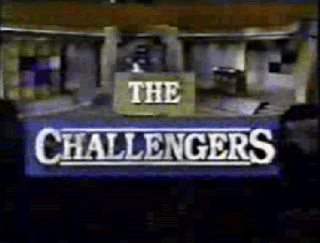
The Challengers is an American game show that aired in syndication from September 3, 1990, until August 30, 1991. The show remained in production for its entire run on the air, differing from most syndicated game shows which usually wrapped in the early summer.
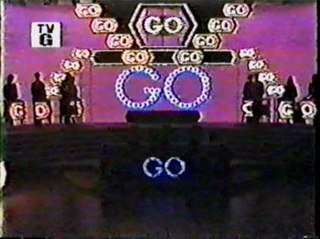
Go is an American television game show created by Bob Stewart and aired on NBC from October 3, 1983, to January 20, 1984. The show featured two teams, each composed of four contestants and a celebrity. The teams had to construct questions one word at a time to convey a word or phrase to their teammates. The concept of Go was based on "Instant Reaction", an endgame played on two different iterations of another game show created by Bob Stewart, Chain Reaction - in 1980 on NBC and from 2006 to 2007 on GSN.

Celebrity Squares is a British comedy game show based on the American comedy game show Hollywood Squares. It first ran on ITV from 20 July 1975 to 7 July 1979 and was hosted by Bob Monkhouse, then—also hosted by Monkhouse—from 8 January 1993 to 3 January 1997.
Shafted was a British game show that aired on ITV from 5 to 26 November 2001 and was hosted by Robert Kilroy-Silk.

Temptation was an Australian game show which premiered on the Nine Network on 30 May 2005 and aired at 7.00pm. Hosted by Ed Phillips and Livinia Nixon, the show was a remake of Sale of the Century, which aired on Nine in the same timeslot for more than twenty years between 1980 and 2001. Temptation had the same general format of its predecessor, but with several new features and a de-emphasis on the "shopping" aspects of the endgame. The show ran until 30 November 2007, when it was placed on hiatus by the network following strong competition from game show Deal or No Deal on the rival Seven Network; during the hiatus, Nine filled the timeslot with episodes of the American sitcom Two and a Half Men. When Ed Phillips made an appearance on The NRL Footy Show he announced "maybe summer" would be the return of the show. This statement was accurate, as Temptation returned for a shortened fourth series from 1 December 2008 with unaired episodes which were recorded during 2008. During that time, Ed Phillips was dumped by the Nine Network after his contract expired in November, and Temptation never returned to the schedule. After 23 January 2009, when the show's final episode aired, all Temptation websites were removed, and Two and a Half Men returned to Channel Nine's 7:00pm schedule.

The Vault is a British game show based on the original Israeli version called HaKassefet Hebrew: הַכַּסֶפֶת) that aired on ITV from 11 May 2002 to 24 August 2004. It was first hosted by Davina McCall in 2002, then hosted by Melanie Sykes from 2003 to 2004 and finally hosted by Gabby Logan who stepped in for Sykes for the latter half of 2004 when Sykes went on maternity leave.
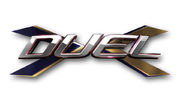
Duel is an American game show hosted by Mike Greenberg that first aired from December 17 to December 23, 2007 on ABC. The show aired as a week-long six-episode tournament at 8:00 p.m. from Monday through Friday with the finale on Sunday.
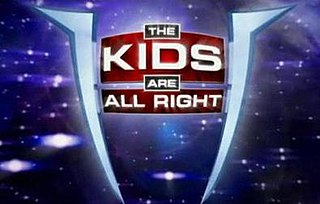
The Kids Are All Right is a British game show that aired on for BBC One from 12 April to 14 June 2008 and is hosted by John Barrowman.
19 Keys is a British game show that aired on Five. It aired five nights a week from 10 November to 5 December 2003. It was hosted by Richard Bacon.
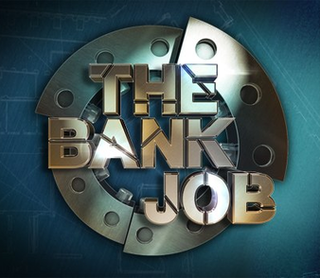
The Bank Job is a British television game show broadcast live on Channel 4, hosted by George Lamb. It was first broadcast on 2 January 2012 and ended on 17 March 2012.
Cleverdicks was a British television quiz show for Sky Atlantic, hosted by Ann Widdecombe. Running for 30 episodes, it was later repeated on Challenge. Four contestants competed in each episode for the right to call themselves "cleverdicks" and play for a roll-over cash jackpot. As explained by Widdecombe at the beginning of the first episode, a cleverdick is a person who is "irritatingly and ostentatiously knowledgeable or intelligent." The question material was therefore primarily academic in nature.

Breakaway is a British quiz show presented by Nick Hancock, which aired on BBC Two from March 12 to 2 November 2012. In it, six contestants compete for a cash jackpot of up to £10,000. They can win a smaller amount by working together, or one or two contestants may choose to "break away" from the group in order to win a larger amount for themselves.
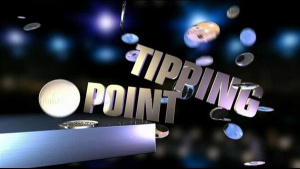
Tipping Point is a British game show that is broadcast on ITV1, although repeats are shown on W and Really. First airing on 2 July 2012, the programme is presented by Ben Shephard and features three players answering questions on the subject of general knowledge to win counters which they use on a large coin pusher arcade-style machine. Only the winner at the end has a chance to take home any money; the others leave with nothing except any non-cash prizes they may have won during the game.
Face the Clock is a game show that was broadcast on Channel 4 from 7 January to 22 February 2013, and was hosted by Rory Bremner. On each episode, six contestants compete to build up a cash prize and eliminate one another in a series of timed rounds until one is left to play for the money.

Million Dollar Minute is an Australian quiz show which aired on the Seven Network. It premiered on 16 September 2013. The show was originally hosted by Grant Denyer, and later by Simon Reeve, and aired at 5:30 pm on weeknights. The show was cancelled in September 2015 and was replaced by The Chase Australia in its timeslot. Repeats are currently shown on 7TWO in place of Home and Away's Early Years on Hiatus.
L'eredità is an Italian Rai 1 game show. It premiered on 29 July 2002. From 29 July 2002 to 10 June 2006, it was hosted by Italian presenter Amadeus. He was succeeded by Carlo Conti, who hosted the show until 14 April 2014, when he was replaced by Fabrizio Frizzi. Frizzi hosted until 23 October 2017, when he became ill during the taping of the next show and was taken to the hospital. Carlo Conti substituted for Frizzi from 30 October 2017 to 15 December 2017, and he hosted the special episode in tandem with Fabrizio Frizzi when the latter returned to host the quiz. On 16 December 2017, Fabrizio Frizzi resumed hosting the show by himself until 25 March 2018. The next day, Frizzi died of a brain haemorrhage. Following a hiatus due to Frizzi's death, the game returned from 3 April 2018 until the end of the season with the host Carlo Conti. Flavio Insinna has presented the show since 24 September 2018.
Two Tribes is a BBC game show that aired on BBC Two from 18 August 2014 to 31 August 2015, hosted by Richard Osman.

Rebound is a British game show that aired on ITV from 17 August 2015 to 11 November 2016 and is presented by Sean Fletcher.
Alphabetical is a game show that aired on ITV from 15 August 2016 to 27 October 2017, hosted by Jeff Stelling. It is largely based on the Spanish quiz show Pasapalabra, which itself was derived and iterated from the BBC panel show The Alphabet Game.

Impossible is a British television quiz show created by Hugh Rycroft and produced by Mighty Productions for BBC One. Hosted by Rick Edwards, the show has a maximum prize of £10,000 and features questions in which some answer choices are "impossible" or inconsistent with the given category. Episodes of Impossible are also seen in the United States on the over-the-top internet television services Plex, Xumo and The Roku Channel, with each looping episodes 24 hours a day on its own dedicated streaming channel.